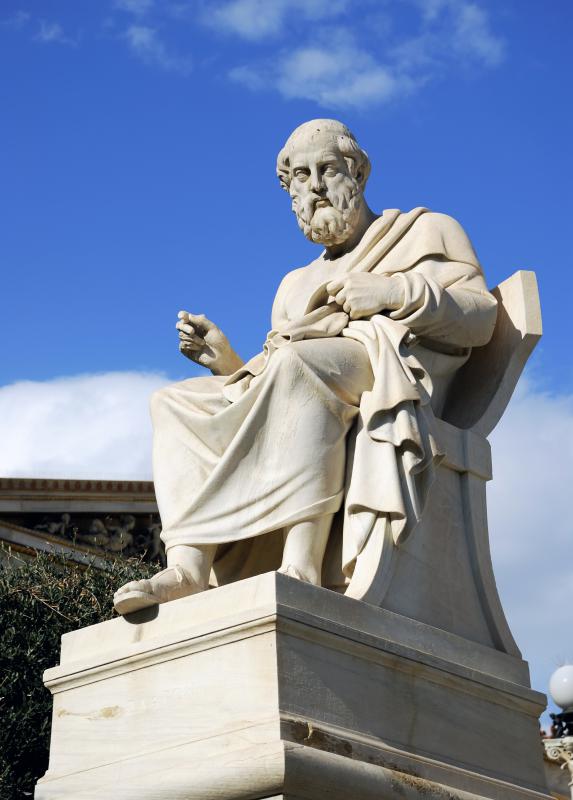At WiseGEEK, we're committed to delivering accurate, trustworthy information. Our expert-authored content is rigorously fact-checked and sourced from credible authorities. Discover how we uphold the highest standards in providing you with reliable knowledge.
What are the Seven Virtues?
Although the concept of seven virtues is associated with Christianity, they actually predate it by several centuries. Most credit the philosopher Plato with listing a few of them. It should be noted that the idea of defining virtuous ways of being is not limited to Christianity — in Bushido, the code followed by the Japanese Samurai a set of seven virtues is described too, though these differ from traditional Christian lists. Theologians and theorists may define the virtues differently and they have undergone some changes.
Some of the early virtues described are done so in the writing of St. Paul, who talks about the greatest of these virtues being love. The other virtues St. Paul lists are called theological and are faith and hope. The remaining four virtues usually listed are called cardinal virtues, and philosophers like St. Augustine and Thomas Aquinas developed definitive lists.
The cardinal virtues are:
- Prudence
- Justice
- Restraint
- Courage or Fortitude: strength to bear difficult to things or to be brave in the face of obstacles.
As mentioned the theological virtues are:
- Faith
- Hope
- Love or Charity: love and charity are often considered together and generally mean acting in a selfless way with love for others.

Another list of seven virtues was developed as counterbalance to the seven deadly sins, which are lust, gluttony, greed, sloth, wrath, envy and pride. Respectively, counterbalancing qualities that Christians should possess are: chastity, temperance, charity, diligence, patience, kindness and humility. When people directed themselves toward attaining and exhibiting these qualities, they could hopefully avoid the seven deadly sins.
Sometimes Christians add an eight virtue to either list of virtues — justice. However, some argue that the other virtues would encompass justice, especially charity and temperance.

Bushido is translated as “The Way of the Warrior” and it was a chivalric code of conduct followed by Japanese Samurai based on theories in Buddhism and Confucianism. In Bushido, the individual must pursue seven virtues also. These are rectitude, courage, benevolence, respect, honesty, loyalty, and honor.
Other groups have or had similar codes including European Knights during the medieval period. Though lists of virtues varied, some generally included were courage, justice, nobility, mercy, faith, hope and strength. Of course some virtues listed for knights had more to do with practical development of skills. For instance, being a good horseman might be considered a knightly virtue.

In philosophy and religion there are other similar ideas. In Confucianism order is obtained through five right relationships defined as father/son, older brother/younger brother, husband/wife, younger people to elders, and subject/ruler. In Buddhism, the Noble Eightfold Path defines those ways in which a person can free himself from suffering. These are right view, right intention, right speech, right action, right livelihood, right effort, right mindfulness and right concentration. Essentially the idea of virtues is certainly not unique to Christianity and many philosophies and religions far predating it have asked followers to act or “be” in certain way as a means of achieving some sort of salvation or order.
AS FEATURED ON:
AS FEATURED ON:

















Discussion Comments
Islam has those virtues too.
The seven virtues definitely exist in holy books. I think that this is how philosophers like Plato learned of them and discussed them. People may have different opinions of this but since I believe that religion has existed since the existence of people, in my opinion, it is God who has taught us these virtues.
@literally45-- I agree with you but some people say that each religion tends to emphasize some of these virtues more than others. Although a person of faith will do his or her best to follow all of them.
A friend of mine has studied several different religions and their holy books. He claims that for example, Christianity emphasizes love, whereas Islam emphasizes justice. He came to this conclusion by reading and analyzing the Bible and the Qur'an. I'm not sure if this is true, but it might be.
I think that the seven virtues are a philosophical idea based on religion. I don't think that these virtues are listed in any holy book, although they may be described or mentioned in different ways.
I don't think that there is a religion on earth that does not preach these seven virtues. They may not be written as a list or ordered the same way, but essentially, all religions teach their followers to follow these values. Faith, hope, love and charity are the essence of religion anyway, whether it's Christianity, Buddhism, Judaism, Islam or any other religion. One cannot have faith without having these values. They are all intertwined.
Post your comments